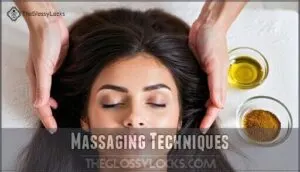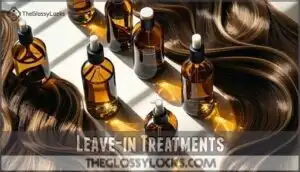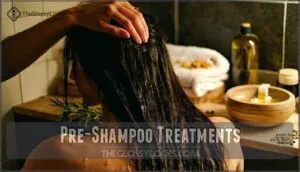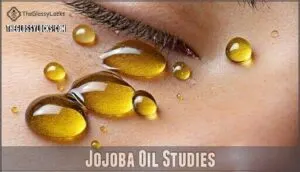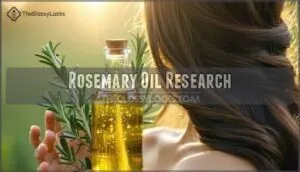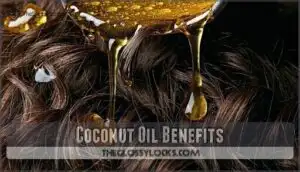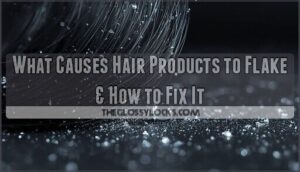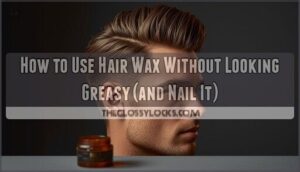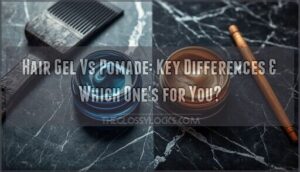This site is supported by our readers. We may earn a commission, at no cost to you, if you purchase through links.
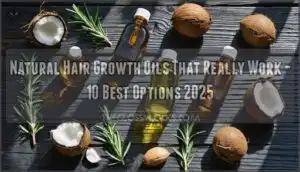
You’ll find rosemary oil leads the pack with clinical studies showing it rivals minoxidil for regrowth. Coconut oil penetrates deep into hair shafts, while jojoba oil mimics your scalp’s natural sebum.
Castor oil’s ricinoleic acid boosts circulation, and argan oil delivers vitamin E for repair.
These oils work by reducing inflammation, improving blood flow, and creating ideal conditions for growth.
The key lies in choosing the right oil for your specific hair type and applying it correctly. Different oils target different growth mechanisms, and knowing which combinations work best can release your hair’s full potential.
Table Of Contents
- Key Takeaways
- Natural Hair Growth Benefits
- Hair Oil Application Methods
- Top 10 Natural Hair Growth Oils
- 1. The Ordinary Hair Density Peptide Serum
- 2. Mielle Rosemary Mint Light Hair Oil
- 3. Kiehls Scalp Hair Oil Treatment
- 4. Shea Moisture Coconut Oil Treatment
- 5. Handcraft Blends Cold Pressed Grapeseed Oil
- 6. PATTERN Beauty Jojoba Hair Serum
- 7. R+Co Baobab Oil Hair Styler
- 8. Briogeo Tea Tree Scalp Revival Oil
- 9. Pure Sweet Almond Oil for Skin and Hair
- 10. Andalou Naturals Argan Scalp Treatment
- Scientific Evidence for Hair Oils
- Choosing The Right Hair Oil
- Frequently Asked Questions (FAQs)
- What are the best natural oils for hair growth?
- How to use oils for healthy hair growth?
- Are essential oils good for your hair?
- Can plant based oils improve hair quality?
- Can natural oils regrow hair?
- Does hair grow faster with natural oils?
- Which homemade oil is good for hair growth?
- How can I regrow my hair in 3 weeks naturally?
- Can hair oils cause hair loss?
- How often should you use hair oils?
- Conclusion
Key Takeaways
- You’ll get clinically proven results with rosemary oil – studies show it matches minoxidil’s effectiveness for hair regrowth while causing less scalp irritation than pharmaceutical treatments.
- You need to match oils to your specific hair type – fine hair requires lightweight options like argan or grapeseed oil, while coarse or curly hair benefits from heavier oils like castor or coconut oil.
- You’ll see the best results with consistent application – apply oils to a damp scalp three times weekly, massage for 5-10 minutes to boost blood circulation, and leave for 30+ minutes before shampooing.
- You can’t expect overnight miracles – natural hair growth oils work gradually over months by nourishing follicles, reducing inflammation, and creating optimal conditions for healthy growth rather than providing instant results.
Natural Hair Growth Benefits
Natural hair growth oils work by nourishing your scalp and hair follicles with essential nutrients that promote stronger, thicker hair growth.
You’ll see the best results when these oils improve blood circulation to your scalp, reduce inflammation, and provide deep moisturization that prevents breakage and hair loss.
Reducing Hair Loss
When you’re watching your hairline retreat like a disappearing act, natural hair growth oils can help stop the show.
Don’t let your hair’s grand finale be a solo act – natural oils can steal the spotlight back.
These powerful treatments reduce DHT, the hormone that shrinks follicles and causes hair loss.
Oils like rosemary and peppermint boost follicle stimulation while preventing protein loss from your strands.
They also calm scalp inflammation and improve nutrient delivery to starving hair roots, making hair loss prevention both natural and effective.
Addressing nutritional deficiencies can further support hair health.
Promoting Hair Thickness
Your hair’s thickness potential depends on strategic scalp stimulation and consistent use of natural hair growth oils.
DHT blockers like rosemary oil combined with protein intake create ideal conditions for hair density improvement.
- Oil combinations with jojoba and castor oils penetrate follicles deeply
- Hair thickening oil treatments increase strand diameter over time
- Hair growth serum formulas boost circulation to dormant follicles
- Natural hair growth oils strengthen existing strands while promoting new growth
Improving Scalp Health
Your scalp’s microbiome balance directly impacts hair growth potential.
Natural oils regulate sebum production while reducing inflammation that blocks follicles. Rosemary oil enhances blood circulation and provides DHT reduction benefits.
Regular scalp massage with these oils treats dry scalp conditions effectively.
| Scalp Concern | Best Oil | Key Benefit |
|---|---|---|
| Dry/Flaky Scalp | Jojoba Oil | Sebum Regulation |
| Inflammation | Olive Oil | Inflammation Reduction |
| Poor Circulation | Rosemary Oil | Blood Circulation |
| DHT Buildup | Green Tea Oil | DHT Reduction |
Hair Oil Application Methods
You’ll get the best results from hair oils when you apply them correctly and consistently.
The method you choose depends on your hair type and specific goals, whether you’re targeting scalp health, hair growth, or damage repair.
Massaging Techniques
Massaging your scalp with circular motions using gentle pressure points activates blood flow and enhances oil absorption.
Use your fingertips, not nails, applying light pressure for 5-10 minutes.
This hair growth stimulation technique helps scalp massage oil penetrate deeper into follicles.
For enhanced scalp stimulation, consider specialized massage implements during your hair care.
Consider massage tools like wooden combs or silicone brushes for consistent pressure during your hair growth oils routine.
This approach can lead to better hair care results.
Leave-in Treatments
Leave-in treatments let you harness natural hair growth oils without the rinse-and-repeat routine.
These lightweight formulas work around the clock, delivering nutrients while you go about your day. Consistent use of these oils can offer long-term moisturizing benefits.
5 Leave-in Treatment Tips:
- Apply to damp hair – Oil absorption improves when hair cuticles are slightly open from moisture
- Focus on mid-lengths to ends – Avoid overwhelming your scalp with too much product
- Use 2-3 times weekly – Application frequency matters more than quantity for overnight benefits
- Layer products strategically – Apply lighter oils first, then heavier ones for ideal product layering
- Test for scalp sensitivity – Start with small amounts to gauge your skin’s reaction to natural hair growth oils
Pre-Shampoo Treatments
Pre-shampoo treatments maximize oil absorption and hair growth benefits.
Apply warm coconut, olive, or avocado oil to dry hair thirty minutes before washing. This application duration allows deep penetration based on hair porosity levels.
Focus scalp stimulation through gentle massage motions.
Best oils for prewash treatments include rosemary and jojoba. These natural hair growth oils protect against shampoo’s harsh effects while delivering nutrients, promoting hair growth.
Top 10 Natural Hair Growth Oils
You’ll find the most effective natural hair growth oils backed by clinical research and proven results below.
These ten options target different hair concerns, from thinning and breakage to scalp irritation and slow growth.
1. The Ordinary Hair Density Peptide Serum
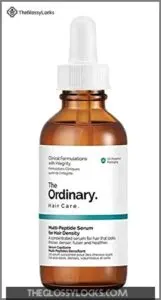
The Ordinary Multi-Peptide Serum consistently delivers impressive results through its scientifically-backed formula.
You’ll get peptide complexes like REDENSYL, Procapil, and CAPIXYL working together to support hair follicle health.
The lightweight, water-based serum absorbs quickly without greasiness, and users report noticeable hair growth at the hairline within 4-8 weeks of nightly application.
At an affordable price point, it’s become a favorite among those seeking thicker, denser hair without breaking the bank.
Best For: Anyone with thinning hair seeking a lightweight, leave-in serum to boost hair density and scalp health without irritation.
- Results take several weeks to months to appear, requiring patience.
- Dropper application can be messy if not massaged in right away.
- Some users report mild stickiness or irritation with overuse.
- Noticeably increases hair thickness and fullness when used nightly.
- Absorbs quickly without leaving greasy residue or buildup.
- Affordable compared to other advanced hair serums.
2. Mielle Rosemary Mint Light Hair Oil
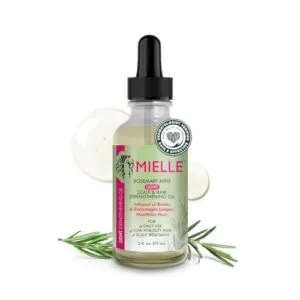
When you’re ready to tap into your hair’s potential, Mielle Rosemary Mint Light Hair Oil delivers the power you need.
This award-winning formula combines biotin, rosemary oil, and mint with nourishing oils like castor, jojoba, and coconut.
Users report substantially reduced hair shedding within 2-3 months, with some experiencing only 2-3 strands lost during combing.
The lightweight, non-greasy formula absorbs quickly while providing that invigorating tingle that soothes your scalp and promotes circulation for stronger, healthier growth.
Best For: Anyone seeking lightweight, non-greasy scalp care to reduce shedding, promote growth, and maintain hair health across all textures.
- Visibly reduces hair shedding and breakage with consistent use.
- Absorbs quickly without greasiness or buildup, providing a refreshing, tingly scalp sensation.
- Multi-use formula works for scalp, hair ends, eyebrows, and in protective styles.
- May feel greasy if over-applied or not rinsed as directed.
- Scent can be strong for sensitive users.
- Results may take up to 2-3 months for noticeable improvement.
3. Kiehls Scalp Hair Oil Treatment
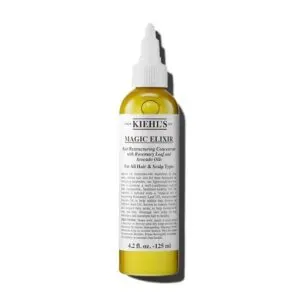
Quality meets affordability in Kiehl’s Scalp Hair Oil Treatment, where avocado oil‘s rich fatty acids team up with rosemary‘s circulation-boosting properties.
You’ll massage this lightweight formula directly onto your scalp before shampooing, letting it work for 10-30 minutes. The nozzle tip guarantees precise application without waste.
Clinical studies show rosemary oil matches minoxidil’s effectiveness for hair growth, while avocado oil strengthens hair shafts and reduces breakage.
Users report thicker hair and less shedding within weeks of consistent use.
Best For: Anyone seeking to improve scalp health, reduce hair loss, and boost hair growth with a lightweight, nutrient-rich oil suitable for all hair types.
- Small bottle size at a higher price point.
- Earthy scent may not appeal to everyone.
- Not equally effective for severe dry scalp or every user.
- Lightweight, non-greasy formula works for fine to thick hair.
- Clinically shown ingredients support visible hair growth and reduce shedding.
- Enhances scalp hydration and comfort, easing dryness and itchiness.
4. Shea Moisture Coconut Oil Treatment
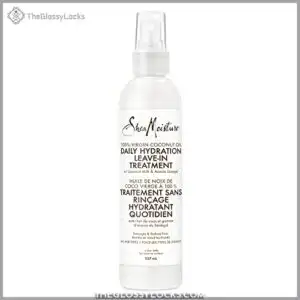
SheaMoisture’s coconut oil treatment delivers concentrated hydration for damaged hair.
This sulfate-free formula combines virgin coconut oil with shea butter and acacia senegal to penetrate hair strands deeply.
You’ll notice improved manageability and reduced frizz after regular use.
The lauric acid in coconut oil strengthens hair by preventing protein loss, while the lightweight spray application won’t weigh down your curls.
It’s particularly effective for detangling and works well as both a daily conditioner and pre-styling treatment for all hair types.
Consistent use can help with scalp’s natural pH.
Best For: Those with dry, frizzy, or curly hair who want daily hydration, easy detangling, and lightweight frizz control.
- Spray mechanism could be improved for finer mist and easier use
- Overuse may cause build-up, especially on fine hair
- Higher price compared to some leave-in treatments
- Deeply hydrates and nourishes hair without weighing it down
- Helps detangle and soften even severely matted or curly hair
- Cruelty-free and made without harsh chemicals, safe for all hair types
5. Handcraft Blends Cold Pressed Grapeseed Oil
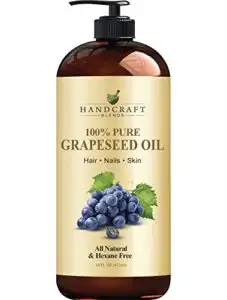
Lightweight grapeseed oil delivers powerful hair growth benefits without weighing down fine strands.
Studies show proanthocyanidins from grape seeds boosted hair follicle cell growth by 230% in mice.
You’ll love its non-greasy texture that absorbs quickly while providing vitamin E and antioxidants.
This hexane-free oil soothes irritated scalps, reduces dandruff, and protects against damage.
Apply a few drops nightly for scalp massage or use as a heat protectant before styling.
Best For: Those wanting a lightweight, natural oil for hair growth, scalp health, and soft, hydrated skin—especially if they have fine, sensitive, or oily hair and skin types.
- Pure, non-greasy, fast-absorbing oil ideal for daily use on hair or skin
- Nourishes scalps and helps reduce dandruff and irritation
- Packed with antioxidants and vitamins to support hair growth and overall health
- No grape aroma, which may disappoint some users
- Benefits for significant hair regrowth in humans aren’t fully proven
- Those with grape allergies or very sensitive skin may react
6. PATTERN Beauty Jojoba Hair Serum
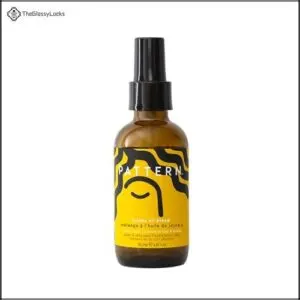
Beyond its lightweight formula, PATTERN Beauty’s Jojoba Hair Serum delivers impressive results for low porosity hair.
You’ll find safflower, jojoba, rosehip, olive, and lavender oils working together to reduce breakage and soothe scalp irritation.
Studies show 95% of users reported softer hair after one week, while 92% noticed increased shine.
The serum absorbs quickly without greasiness, making it perfect for daily use on wet or dry hair.
It’s formaldehyde-free and won’t weigh down your curls.
Best For: Those with low porosity or curly hair looking for a lightweight serum to boost moisture, shine, and scalp comfort.
- Hydrates and softens hair without feeling greasy or heavy
- Reduces breakage, frizz, itchiness, and flaking
- Pleasant lavender scent and formaldehyde-free formula
- Some users find the results just "okay" compared to expectations
- May not dramatically increase hair growth vs. treatments like minoxidil
- Higher price point than basic hair oils, but a little goes a long way
7. R+Co Baobab Oil Hair Styler
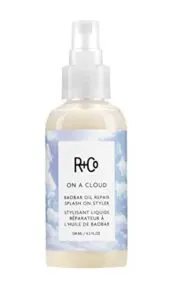
R+Co’s Baobab Oil Hair Styler frequently surprises users with its dual-action formula that repairs while styling.
The baobab oil-protein technology rebuilds damaged hair bonds, while castor oil targets split ends and cuticle damage.
You’ll get 85% less breakage when using it with the full system.
This lightweight leave-in treatment works on damp hair from roots to ends, making detangling easier.
It adds shine without weighing down fine hair, though thick-haired users love how it defines curls and controls frizz effectively.
Best For: Those seeking lightweight conditioning and visible damage repair, especially for color-treated, curly, or bleached hair needing shine and softness.
- Repairs and strengthens damaged hair while easing detangling.
- Adds shine and softness without making hair feel greasy or heavy.
- Defines curls and controls frizz, with a pleasant scent and non-toxic formula.
- Can be too heavy for very fine hair if overused.
- Results vary—some users see minimal softening or shine.
- Extremely damaged hair may require a heavier oil or treatment.
8. Briogeo Tea Tree Scalp Revival Oil
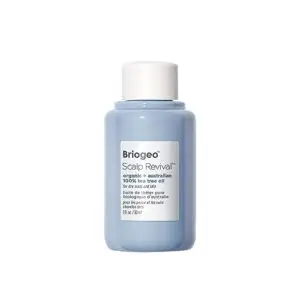
This powerhouse scalp treatment delivers clinically proven results you’ll notice fast.
Clinical studies show it increases scalp hydration by 142% and reduces dry flaking by 98% after just one use.
The formula combines tea tree oil, binchotan charcoal, and witch hazel to detoxify your scalp while balancing oil production.
You’ll get instant cooling relief that soothes irritation and creates the perfect environment for healthy hair growth.
It’s lightweight, absorbs quickly, and works on all hair types without weighing down your strands, providing an ideal condition for healthy hair growth.
Best For: Those with dry, flaky, oily, or itchy scalps seeking fast relief and balanced scalp health.
- Clinically proven to boost scalp hydration and reduce flaking after one use
- Lightweight, absorbs quickly, and suitable for all hair types
- Vegan, cruelty-free, and made with naturally derived ingredients
- Strong tea tree scent may not appeal to everyone
- Higher price for a small bottle
- Packaging is not specified as glass, which may be a preference for some
9. Pure Sweet Almond Oil for Skin and Hair
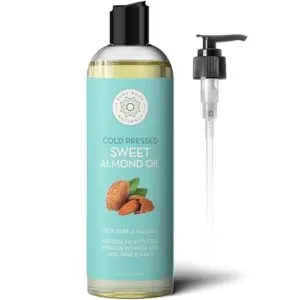
While most people think of almonds as a snack, sweet almond oil delivers serious hair benefits.
This lightweight oil penetrates your hair shaft easily, providing vitamin E and biotin that strengthen strands from within.
You’ll notice less breakage and improved elasticity after regular use.
The oil’s anti-inflammatory properties soothe irritated scalps while its emollient qualities smooth frizz naturally.
Apply it as a pre-shampoo treatment or work a few drops through damp ends for instant conditioning without the greasy residue, using its emollient qualities to achieve this.
Best For: Anyone seeking a lightweight, natural oil to nourish hair, soothe dry scalp, and improve skin hydration, especially those with sensitive or easily irritated skin.
- Absorbs quickly, leaving hair and skin moisturized without greasy residue.
- Packed with vitamins E, A, and biotin to support hair strength, scalp health, and skin vitality.
- Hypoallergenic and fragrance-free, making it suitable for sensitive skin and those prone to migraines.
- Not safe for people with nut allergies due to risk of severe reaction.
- Occasional issues with pump functionality or leakage may require replacing the cap.
- Lack of clear "hexane-free" labeling or details about processing could be a concern for those seeking untreated oils.
10. Andalou Naturals Argan Scalp Treatment
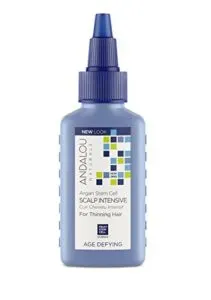
You’ll find this treatment combines argan stem cells with biotin to target thinning hair at the root.
The formula contains 97-98% naturally derived ingredients that won’t weigh down fine hair.
Users report seeing new growth within 2-3 months of daily application.
Simply part your hair into sections and massage a few drops into your scalp.
The non-greasy formula works overnight and stays color-safe.
While some customers experienced leaky bottles, the blend of rice protein and botanical extracts delivers solid results for those seeking fuller, stronger hair.
Best For: People with thinning, fine, or aging hair seeking fuller volume and healthier scalp without heavy residue.
- Stimulates new hair growth with argan stem cells and biotin
- Lightweight, non-greasy, and color-safe formula for daily use
- Vegan, cruelty-free, and uses 97–98% naturally derived ingredients
- Small bottle size requires frequent repurchase and can feel overpriced
- Mixed consumer experiences with leakage or missing seals in packaging
- Results can take 2–3 months and are less effective for beard or chest hair
Scientific Evidence for Hair Oils
You’ll find solid scientific backing for several hair growth oils, though research remains limited compared to pharmaceutical treatments.
Studies show rosemary oil matches minoxidil’s effectiveness, while jojoba and coconut oils demonstrate measurable benefits for hair strength and scalp health.
Jojoba Oil Studies
Jojoba oil’s unique molecular structure allows superior jojoba penetration into hair follicles, making it exceptionally effective for scalp treatment.
Research shows this natural hair growth oil substantially reduces protein loss while providing essential fatty acids that strengthen hair strands and support healthy hair growth. Jojoba oil also contains vitamins for hair health.
Here are 5 key research findings about jojoba oil:
- Follicle Penetration: A 2021 study confirmed jojoba oil effectively penetrates hair follicles better than most hair oils
- Protein Loss Prevention: Clinical research shows a considerable reduction in hair protein loss when using jojoba regularly
- Dandruff Reduction: Studies demonstrate jojoba’s antimicrobial properties effectively reduce dandruff and scalp irritation
- Fatty Acid Content: Research highlights jojoba’s high concentration of beneficial fatty acids that nourish hair follicles
- Hair Breakage Prevention: Scientific evidence shows consistent use reduces hair breakage by up to 30%
Rosemary Oil Research
A 2015 randomized trial found rosemary oil hair growth matched 2% minoxidil after six months in people with androgenetic alopecia.
Rosemary oil works as well as minoxidil for hair growth, but with fewer side effects.
Both treatments showed significant hair count increases with no major difference between them. Rosemary oil caused less scalp itching than minoxidil, improving tolerability.
Rosemary oil also contains carnosic acid benefits which enhances blood flow to the scalp. Mouse studies reported 42% hair growth versus 3% in controls, nearly matching 3% minoxidil effectiveness for natural hair growth oils.
Coconut Oil Benefits
Coconut oil’s lauric acid content sets it apart from other natural hair growth oils by actually penetrating your hair shaft.
This unique ability protects against styling damage and UV protection while reducing protein loss.
Clinical studies show coconut oil hair treatments substantially improve hair softness, making it especially effective for treating brittle hair and supporting healthy hair care routines.
Choosing The Right Hair Oil
Finding the right hair oil isn’t rocket science, but your hair type makes all the difference in what works.
Look for clinically-backed ingredients like rosemary, jojoba, and castor oil while steering clear of sulfates, parabens, and harsh chemicals that can damage your strands over time, using harsh chemicals can be particularly detrimental.
Considering Hair Type
Your hair type determines which natural hair growth oils work best for you.
Fine hair needs lightweight options like argan or grapeseed oil that won’t weigh down strands. Coarse hair and curly hair benefit from heavier oils like castor or coconut oil for deep moisture.
Oily scalp responds well to jojoba oil’s sebum-regulating properties, while dry hair craves nourishing avocado oil.
Regular use can boost blood circulation, promoting hair growth and strengthening roots with the help of natural hair growth oils and proper blood circulation.
Identifying Key Ingredients
Look for proven natural hair growth oils with specific active compounds that boost ingredient efficacy.
Rosemary oil blocks DHT while improving scalp absorption. You can find rosemary oil products online.
Combine essential oils like peppermint with carrier oils such as jojoba for enhanced hair growth benefits. Effective oil combinations include castor oil’s ricinoleic acid and coconut oil’s lauric acid for maximum results.
Avoiding Harsh Chemicals
Unfortunately, many commercial hair products contain harsh chemicals that can sabotage your natural hair growth journey.
Sulfates strip away essential oils, while parabens disrupt hormone balance, and silicone buildup clogs follicles, and alcohol dries out your scalp.
Phthalates pose serious health risks, so choose natural hair growth oils free from these ingredients for healthier hair care.
Frequently Asked Questions (FAQs)
What are the best natural oils for hair growth?
Rosemary oil absolutely dominates hair growth research, matching minoxidil’s effectiveness in clinical trials. You’ll also see impressive results with jojoba, castor, and peppermint oils for stimulating follicles naturally.
How to use oils for healthy hair growth?
Apply oils to damp scalp for better absorption. Massage gently for 5-10 minutes to boost blood flow. Leave for 30+ minutes before shampooing. Use consistently three times weekly for best results.
Are essential oils good for your hair?
Yes, essential oils can benefit your hair when used properly. Dilute them with carrier oils like jojoba or coconut oil before applying to avoid irritation and maximize their therapeutic effects.
Can plant based oils improve hair quality?
Plant-based oils can substantially improve hair quality by penetrating the hair shaft, reducing protein loss, and sealing cuticles.
Studies show oils like coconut, argan, and jojoba effectively moisturize, reduce breakage, and add shine to damaged hair.
Can natural oils regrow hair?
Some oils can help regrow hair, but they’re not miracle cures.
Rosemary oil shows promise in studies, performing as well as minoxidil for androgenic alopecia.
You’ll need consistent use and realistic expectations.
Does hair grow faster with natural oils?
Natural oils can boost hair growth by improving scalp health and blood circulation.
Studies show rosemary oil matches minoxidil’s effectiveness, while jojoba and coconut oils strengthen strands and reduce breakage for healthier growth.
Which homemade oil is good for hair growth?
You’ll find rosemary oil mixed with a carrier like jojoba creates the most effective homemade blend. Studies show rosemary oil matches minoxidil’s effectiveness for hair growth when consistently applied.
How can I regrow my hair in 3 weeks naturally?
You can’t regrow significant hair in just 3 weeks naturally.
Hair growth takes months.
However, you can improve scalp health with rosemary oil massages, proper nutrition, and gentle care to optimize future growth.
Can hair oils cause hair loss?
Studies show 80% of hair loss cases stem from genetics, not oils.
You can safely use natural hair oils without causing hair loss.
Poor-quality oils with harsh chemicals or over-application might irritate your scalp, but pure oils like jojoba and rosemary actually promote healthy growth when used properly.
How often should you use hair oils?
You’ll want to use hair oils about three times per week for best results. Consistent application to damp scalp helps absorption, but daily use can clog pores and cause buildup.
Conclusion
Think of natural hair growth oils as your hair’s personal nutrition plan – they feed your follicles exactly what they need to thrive.
You’ve discovered that natural hair growth oils offer science-backed solutions for healthier, stronger hair.
From rosemary’s proven regrowth benefits to coconut oil’s deep penetration, each oil targets specific growth mechanisms.
You’ll achieve the best results by matching oils to your hair type and applying them consistently, remembering that patience is key – natural hair growth oils work gradually but effectively when you give them time to nourish your scalp and strands, leading to healthier hair.
- https://academic.oup.com/bjd/article/191/Supplement_1/i72/7698756
- https://www.reddit.com/r/HaircareScience/comments/95bba1/has_there_been_any_scientific_document_proof_of/
- https://pubmed.ncbi.nlm.nih.gov/25842469/
- https://trichology.com/the-ultimate-guide-to-natural-hair-oil-products-for-every-hair-type/
- https://www.hairknowhow.com/oils-for-hair-growth

